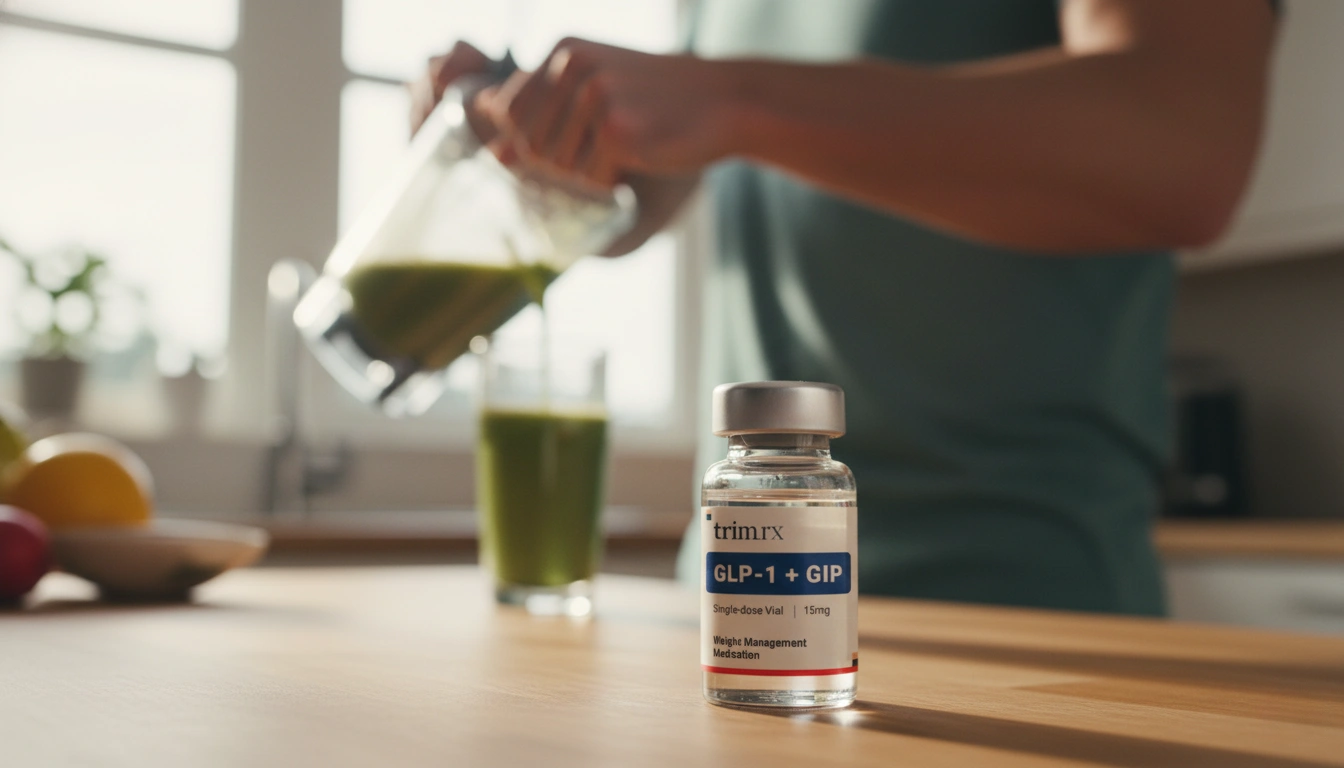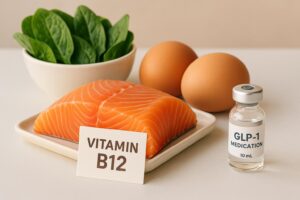Can You Take Creatine While on GLP-1 Medications?

Have you ever wondered how to optimize your fitness routine while managing your weight with GLP-1 medications? It’s a common challenge faced by many individuals seeking to enhance their overall health and wellness. The integration of effective supplements like creatine into your regimen could offer a unique advantage, particularly for those navigating the complexities of weight management with GLP-1 therapies.
GLP-1 medications, including semaglutide (Ozempic, Wegovy) and liraglutide (Saxenda), have gained traction as transformative tools for weight loss. They work by mimicking the effects of the GLP-1 hormone, which plays a crucial role in regulating blood sugar and appetite. However, while these medications can facilitate weight loss, they may also lead to muscle loss and nutrient deficiencies. This is where creatine supplementation comes into play, potentially offering a means to preserve muscle mass and enhance exercise performance.
In this blog post, we will explore the intersection of creatine and GLP-1 medications, addressing key questions such as: Can you take creatine while on GLP-1 medications? We’ll delve into the benefits of creatine, how it can complement your weight loss journey, and the best practices for incorporating it into your routine. By the end, you’ll have a clearer understanding of how to effectively manage your health and fitness goals while on GLP-1 therapy.
Introduction
As we embark on this exploration, it’s important to grasp the significance of understanding the relationship between creatine and GLP-1 medications. With the increasing popularity of GLP-1 therapies, many individuals are curious about how to maintain their exercise regimen and muscle health while using these medications. The implications of muscle loss during weight loss can be serious, impacting metabolism and overall health.
Our goal in this article is to provide you with a comprehensive overview of creatine, its role in muscle preservation, and the considerations to keep in mind when using it alongside GLP-1 medications. We will cover:
- An overview of GLP-1 medications and their mechanisms.
- The role of creatine in muscle health and exercise performance.
- The potential interactions between creatine and GLP-1 medications.
- Best practices for integrating creatine into your regimen while on GLP-1 therapy.
- Additional tips for optimizing your fitness journey.
Together, we will navigate these topics, empowering you to make informed decisions that align with your health and wellness aspirations.
Understanding GLP-1 Medications
GLP-1 medications are a class of drugs designed primarily for managing weight and type 2 diabetes. They mimic the effects of the natural hormone GLP-1, which is involved in several physiological processes, including:
- Increasing insulin secretion: GLP-1 medications stimulate the pancreas to release insulin in response to food intake, which helps lower blood sugar levels.
- Slowing gastric emptying: By delaying the movement of food from the stomach to the intestines, these medications promote a feeling of fullness, leading to reduced appetite and food intake.
- Reducing appetite: GLP-1 medications act on the brain’s appetite-regulating centers, further curbing hunger and cravings.
While these benefits make GLP-1 medications effective for weight loss, they can also lead to unintended consequences, including muscle loss. Research indicates that rapid weight loss, particularly when not paired with adequate nutrition and exercise, can result in a significant reduction in lean muscle mass. This is where understanding the role of creatine becomes crucial.
The Role of Creatine in Muscle Health
Creatine is a naturally occurring substance in the body, primarily found in muscle cells. It plays a vital role in energy production during high-intensity exercise, making it a popular supplement among athletes and fitness enthusiasts. Here’s how creatine can support muscle health:
-
Increased Muscle Energy: Creatine supplementation enhances the availability of phosphocreatine in muscles, which helps regenerate ATP (adenosine triphosphate), the primary energy carrier in cells. This process is particularly beneficial for activities that require short bursts of energy, such as weightlifting or sprinting.
-
Muscle Preservation: During periods of weight loss, creatine can help preserve muscle mass. Studies suggest that individuals supplementing with creatine while in a caloric deficit experience less muscle loss compared to those who do not use it.
-
Enhanced Performance: Creatine is well-documented for its ability to improve strength, power, and exercise performance. This can be particularly advantageous for those on GLP-1 medications, as maintaining an active lifestyle is essential for overall health and weight management.
Summary of Key Benefits of Creatine
- Supports increased strength and muscle mass.
- Enhances exercise performance.
- Aids in muscle preservation during weight loss.
By integrating creatine into your routine, you may be able to mitigate some of the muscle loss associated with GLP-1 medications, allowing you to maintain a healthier body composition.
Can You Take Creatine While on GLP-1 Medications?
The question that many individuals using GLP-1 medications are likely to ask is: Can you take creatine while on GLP-1 medications? The short answer is yes; in most cases, creatine can be safely taken alongside GLP-1 medications. However, there are some important considerations to keep in mind:
-
Individual Variability: While creatine is generally safe, individual responses can vary. It’s essential to consult with a healthcare provider before starting any new supplement, especially if you are on medication. They can provide personalized advice based on your health status and weight loss journey.
-
Hydration: Both GLP-1 medications and creatine can influence fluid balance in the body. GLP-1 medications may slow gastric emptying and lead to gastrointestinal issues, while creatine can cause water retention in muscle cells. Staying adequately hydrated is crucial to support overall health and minimize potential side effects.
-
Timing and Dosage: The timing of creatine supplementation can impact its effectiveness. Most studies suggest a daily dosage of about 5 grams of creatine monohydrate, which can be taken at any time, although post-workout may be optimal for muscle recovery.
-
Monitoring for Side Effects: Some individuals may experience gastrointestinal discomfort with creatine, particularly in the initial stages. If you notice any adverse effects, it may be wise to adjust the dosage or consult your healthcare provider.
Summary of Considerations
- Consult with a healthcare provider before starting creatine.
- Stay hydrated to support fluid balance.
- Consider the timing and dosage of creatine.
- Monitor for any side effects and adjust as necessary.
Best Practices for Integrating Creatine into Your Regimen
To maximize the benefits of creatine while on GLP-1 medications, consider the following best practices:
1. Consult with a Healthcare Provider
Before starting creatine, have a discussion with your healthcare provider. They can help determine if it’s appropriate for you and advise on the best dosage and timing based on your individual health profile.
2. Hydrate Adequately
Creatine can increase water retention in muscles, so it’s vital to drink plenty of fluids throughout the day. This will help support hydration and digestion, especially since GLP-1 medications can slow gastric emptying.
3. Incorporate Resistance Training
If you’re using GLP-1 medications and taking creatine, consider incorporating resistance training into your fitness routine. Resistance training helps build and maintain muscle mass, which is crucial for overall health as you lose weight.
4. Maintain a Balanced Diet
Ensure your diet is rich in high-quality proteins, healthy fats, and complex carbohydrates. This supports not only muscle preservation but also overall well-being during your weight loss journey.
5. Monitor Your Progress
Keep track of your body composition, performance in workouts, and any side effects. This will help you and your healthcare provider make informed decisions about your supplementation and training regimen.
6. Be Patient and Persistent
Weight loss and muscle preservation is a gradual process. Stay committed to your goals and give your body time to adapt to changes in your diet and supplement routine.
Conclusion
Navigating weight loss while on GLP-1 medications can be challenging, but with the right strategies, you can optimize your health and fitness journey. Creatine supplementation presents a valuable opportunity to preserve muscle mass, enhance exercise performance, and support overall well-being. Remember, it’s essential to approach this journey with a focus on individual needs and to consult with a healthcare provider for personalized guidance.
As we’ve explored, combining creatine with GLP-1 medications can be a beneficial strategy for many individuals. By following best practices and maintaining a balanced lifestyle, you can work towards achieving sustainable weight loss while enhancing your fitness.
FAQ
Can I take creatine without exercising?
A1: While creatine can provide benefits even without exercise, its primary advantages are most pronounced when combined with a resistance training regimen. Regular exercise enhances the effectiveness of creatine for muscle preservation and performance.
Are there any side effects associated with creatine?
A2: Some individuals may experience mild gastrointestinal discomfort, especially during the initial stages of supplementation. Staying hydrated and starting with a lower dose may help mitigate these effects.
How long does it take to see results from creatine supplementation?
A3: The timeline varies, but many individuals notice improvements in strength and performance within a few weeks of consistent creatine use, especially when combined with resistance training.
Is creatine safe for everyone?
A4: Creatine is generally safe for most healthy adults. However, those with underlying health conditions, particularly kidney issues, should consult a healthcare provider before starting supplementation.
Can I take other supplements with creatine?
A5: Yes, you can generally take other supplements alongside creatine, but it’s essential to monitor for any side effects and consult a healthcare provider for personalized advice.
By understanding the relationship between creatine and GLP-1 medications and implementing best practices, you can empower yourself to achieve your health and fitness goals effectively. If you’re ready to enhance your journey, consider exploring how TrimRx’s personalized weight loss solutions can support your path to wellness.

Transforming Lives, One Step at a Time
Keep reading
Vitamin B12 and GLP-1 Medications: What to Know
GLP-1 medications can lower B12 absorption and intake; learn symptoms, food sources, supplement options, and how to monitor levels.
Semaglutide Injection Site Reactions: What To Know
Learn why semaglutide injections can cause redness, swelling or nodules, how to prevent and treat them, and when to seek medical care.
TrimRx vs Friday’s
Compare TrimRx and Friday’s telehealth GLP-1 weight-loss programs: pricing, medical support, coaching, delivery, and which fits your needs.



